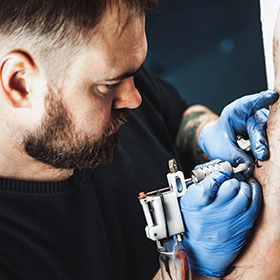Yes, triple antibiotic ointment can help heal tattoos. But it’s not always the best choice.
Tattoo aftercare is crucial for vibrant, lasting ink. Many people wonder if triple antibiotic ointment is good for tattoos. This ointment, containing three antibiotics, aims to prevent infection. Yet, there are mixed opinions. Some experts suggest it may affect healing.
Others believe it can help. It’s important to understand how it works and what it does. So, let’s dive into the pros and cons. This will help you decide if it’s right for your new tattoo.
What Is Triple Antibiotic Ointment
Triple Antibiotic Ointment contains three main ingredients. These are bacitracin, neomycin, and polymyxin B. Each helps to fight different types of bacteria. Bacitracin stops the growth of some bacteria. Neomycin blocks the formation of proteins in bacteria. Polymyxin B damages the bacteria’s outer membrane. Together, these ingredients prevent infections.
This ointment is used for small cuts, scrapes, and burns. It helps prevent infections. It can be found in most homes. Many people use it for minor skin injuries. It is also used in hospitals and clinics. Doctors may recommend it for post-surgery wounds.
Benefits For Tattoo Healing
Triple antibiotic ointment can aid tattoo healing by preventing infections. Keeping the area clean and moist helps the skin recover. Always follow your tattoo artist’s aftercare instructions for the best results.
Infection Prevention
Triple antibiotic ointment helps prevent infections. Tattoos are open wounds. Germs can enter and cause problems. The ointment has three powerful antibiotics. They work together to keep bacteria away. This helps your tattoo heal safely.
Moisture Retention
Keeping a new tattoo moist is very important. Dry tattoos can crack and scab. This can ruin the design. Triple antibiotic ointment helps keep the tattoo moist. It forms a barrier on your skin. This keeps moisture in and germs out.
Potential Risks
Triple antibiotic ointments can cause allergic reactions. Some people may experience redness or itching. Blisters can also form on the skin. These reactions might harm the tattoo. It’s best to test the ointment first. Apply a small amount on a different skin area. Wait 24 hours and see if there’s any reaction.
Triple antibiotic ointments might fade tattoo colors. These ointments contain ingredients that can affect the ink. The tattoo might lose its bright look. The colors can become dull. It’s better to use products made for tattoos. They help maintain the color and shine.
Expert Opinions
Triple antibiotic ointment can help heal tattoo wounds and prevent infection. Some experts suggest using it cautiously on new tattoos. Always follow your tattoo artist’s aftercare instructions.
Dermatologists’ Views
Dermatologists say triple antibiotic ointment can help prevent infection. It keeps the tattoo area moist. This helps with healing. Some people might be allergic to the ointment. They could get a rash or swelling. Always test a small spot first. Doctors suggest checking with a dermatologist before use.
Tattoo Artists’ Perspectives
Many tattoo artists have mixed feelings. Some say the ointment is good for new tattoos. They believe it reduces the risk of infection. Others prefer special tattoo creams. They think these creams are made for tattoos. Some ointments can cause the colors to fade. It’s best to ask your tattoo artist. They know what works best.
Alternative Aftercare Products
Triple antibiotic ointment is not ideal for tattoos. It can cause allergic reactions and slow healing. Consider alternative aftercare products for better results.
Natural Remedies
Aloe vera helps with healing. It keeps the skin moist. Coconut oil is another great option. It reduces redness and prevents infection. Shea butter also works well. It hydrates the skin. These natural remedies are safe. They have fewer side effects. Always test a small area first. This ensures no allergic reactions.
Commercial Products
Many commercial products are available. Aquaphor is a popular choice. It soothes and protects the tattoo. H2Ocean is another good product. It speeds up healing. Tattoo Goo is well-known too. It nourishes the skin. These products are designed for tattoo aftercare. They are easy to find and use.
Proper Tattoo Aftercare Routine
Wash your tattoo with lukewarm water and a mild soap. Pat it dry with a clean towel. Do not rub the tattoo. Use a non-scented moisturizer after cleaning. Keep the tattoo out of direct sunlight. Avoid soaking the tattoo in water. Do not pick at scabs or peeling skin. This helps prevent infections and keeps the tattoo looking good.
Use clean hands to apply ointment. Apply a thin layer of triple antibiotic ointment. Do this twice a day for the first few days. After that, switch to a fragrance-free lotion. Do not use too much ointment. Too much can block air and slow healing.
Conclusion
Triple antibiotic ointment can help in tattoo healing. But, it is not always the best choice. Some people might experience irritation. Always consult your tattoo artist. They know your skin type and needs. Proper aftercare ensures your tattoo stays vibrant.
Clean, moisturize, and protect it. Your tattoo deserves the best care. So, choose wisely for beautiful results.

